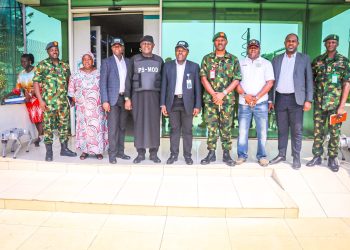By Nkechi Eze
The Minister of Women Affairs, Hajiya Imaan Sulaiman-Ibrahim, has issued a clarion call to Nigerian women to rise with renewed resolve and strategic unity to demand stronger representation in politics, business, and national development. Speaking at a one-day town hall meeting and citizen engagement held in Abuja on Thursday, the Minister urged women across the country to be more intentional, collaborative, and resilient in shaping Nigeria’s future.
“This gathering is not just another meeting,” she declared. “The reason we are here is because we want what is best for ourselves, for the Nigerian woman, for our families, our communities, and our nation.”
At the heart of her message was the call for legislative and structural reforms that would guarantee women a fair and equitable place in governance. She reiterated the importance of the proposed special reserve seats bill currently before the National Assembly, which seeks to allocate designated legislative seats for women to correct years of systemic underrepresentation.
“Women are not asking for favours, we are asking for justice,” Sulaiman-Ibrahim stated. “We constitute a majority of the electorate. We are the voting strength of this country, we and our children. That gives us the permission and the platform to negotiate for anything, and we must start mastering the art of political negotiation.”
She added that the days of fragmented efforts among women competing against each other for the same opportunities must end. “We must be strategic. Five women vying for one seat only splits the votes and empowers the status quo. We must support one another, mentor one another, and make our collective voices count.”
The Minister also charged traditional and community leaders, civil society, and the private sector to support this push for gender inclusion, stating, “If women are empowered, families are stronger. Communities are more stable. The economy thrives.”
Hajiya Hauwa Ibrahim, wife of the Ona of Abaji and President of the FCT Traditional Rulers Wives Association, praised the minister’s inclusive leadership style and echoed her call for unity and shared responsibility. “What I see here today gives me hope,” she said. “Traditional institutions are ready to partner with women leaders to drive change. This is not just about politics; it’s about the future of our children and the strength of our communities.”
Also speaking at the engagement, Adedayo Benjamins-Laniyi, Mandate Secretary of the FCT Women Affairs Secretariat, expressed optimism about the trajectory of women empowerment under the current administration. “We are seeing real movement, real conversations, and real leadership,” she said. “Madam Minister is not just talking she’s building bridges, breaking barriers, and inspiring a generation.”
Benjamins-Laniyi stressed that Abuja and the FCT stand as examples of how policy can be transformed into visible progress for women. “From economic empowerment to leadership inclusion, the FCT is setting the pace,” she added.
Ruth Agbo, President of the Association of Women in Trade and Agriculture, called attention to the immense potential of women in the informal sector. “Nigerian women are ready,” she declared. “We have the drive, the passion, and the resilience to scale up agricultural production and transform trade. What we need is support in the form of equipment, access to credit, and the right training.”
She emphasized that investment in women’s economic activities would create ripple effects across rural and urban communities, reduce poverty, and enhance food security.
Permanent Secretary of the Federal Ministry of Women Affairs, Maryam Keshinro, concluded the session by highlighting the significance of the ideas shared during the engagement. “This town hall has demonstrated one thing clearly: Nigerian women are no longer waiting to be given power. We are ready to take it constructively, responsibly, and purposefully,” she said.
Keshinro assured participants that the Ministry is committed to transforming conversations into action, promising continued engagements, policy reforms, and programmes that will support women at all levels of society.
As the session drew to a close, voices around the hall echoed with resolve a collective agreement that the time for half-measures and symbolic gestures was over. Nigerian women, they agreed, are ready to step fully into their roles as decision-makers, influencers, and nation builders.
“The future of Nigeria is female, not as a slogan, but as a reality we must build together,” the Minister concluded to thunderous applause.














